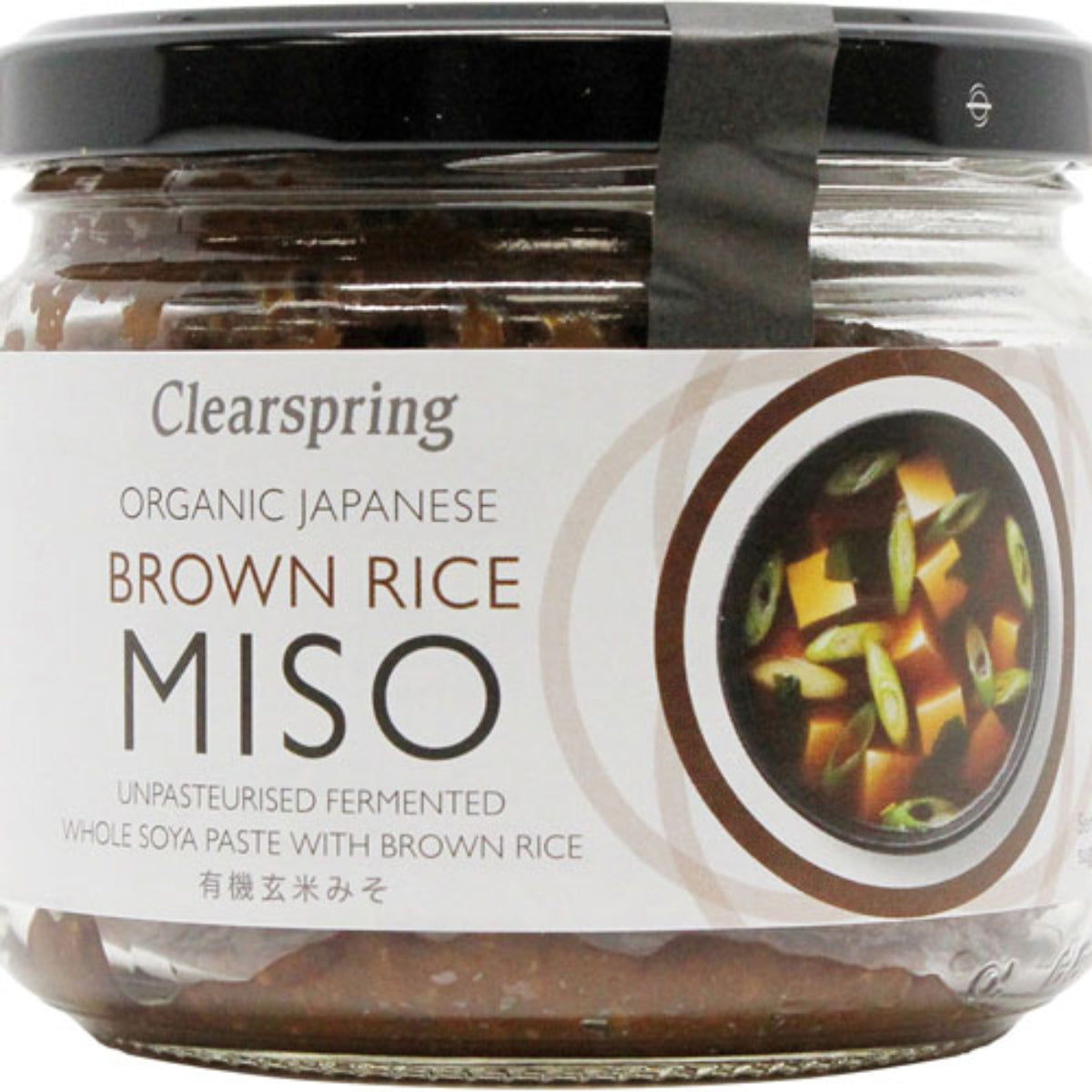
Ingredients: Whole soybeans (47%)*, cultured brown rice (33%)*, sea salt, water.
*organically grown
Miso is a live product and ongoing fermentation may cause the lid to bulge. It will still be safe to consume. Harmless white yeasts may develop from exposure to air. Simply skim off.
Details Click to see more
IMPORTANT NOTICE:
Clearspring guarantees to deliver the best quality organic miso from Japan. Miso is an authentic (vegan) fermented food which has been produced in Japan since the 8th century. Over 1,000 tons of miso is consumed there daily in many dishes and soups.
Due to the high demand for Clearspring miso, they contract produce organic miso at several manufacturers in different regions in Japan. All their miso is made to traditional recipes with the best possible organic ingredients - but since miso is a live product the taste, colour and consistency will vary slightly depending on the region and the season.
The lighter coloured miso often comes from the southern region, where due to the warmer climate the required maturity time is shorter than in the northern region which typically make darker miso. Occasionally however the miso may continue to naturally ferment in the jar and as a result the colour of the miso will gradually darken over time. This continuing maturation may also cause the lid to bulge but rest assured that the product is still delicious and safe to consume.
To slow down the fermentation, simply keep the product refrigerated.
This robust miso, Genmai Miso in Japanese, has been developed for maximum nutrition. Since it is made using whole soya beans and brown rice, it has a very wholefood nutritional profile.
Depending on the region and climate where the miso is made, the skill and experience of the brewmaster judges when the miso has reached its optimum maturity. This can vary from 6 months during a hot summer period in certain prefecture to 18 months in colder regions.
Enjoy this hearty miso year-round in sauces, spreads, baked dishes, soups and stews.
What is miso?
Miso is a traditional fermented Japanese staple food and seasoning made from different types of grains but mainly soya and a unique koji fermentation culture.
During the 18 years Clearspring's founder Christopher Dawson lived in Japan he became an expert on miso quality, and the Clearspring range is his selection of the finest traditionally made Japanese miso.
All traditionally fermented Japanese miso is prepared by cooking the finest organically grown ingredients (whole soya beans and cereal grains) and combining them with a koji culture (grains or soya beans inoculated with Aspergillus oryzae mould spores) sea salt and water. Then naturally aged in cedarwood kegs over many months at ambient temperature the enzymes from the koji, along with naturally occurring yeasts and bacteria, gradually break down the complex grains and beans into readily digestible amino acids, fatty acids and simple sugars.
The resulting miso has rich and complex flavours and an abundance of umami, the fifth taste.
How should miso be stored?
Generally, the best way to store miso to maintain its freshness and quality is in a cool cupboard or refrigerator. However, it really depends on climatic conditions and personal preference. High temperatures will encourage further fermentation, which although not harmful, will darken the colour and alter the flavour of the miso as well as possibly leading to a build-up of pressure within the packaging.
How salty is miso?
Salt plays an integral part in many fermented and pickled foods. It acts as a check to the fermentation process, creating foods with optimum nutrition but preventing them from spoiling. Miso contains enough salt to successfully control the fermentation, with the actual amount varying from 5% for lighter varieties up to 12% for stronger, darker varieties.
Miso is a concentrated seasoning with considerable flavouring ability, so there is no need to use a lot of it. When substituting miso for salt, add approximately one to two teaspoons of miso for one quarter of a teaspoon of salt. This way salt intake can be lowered and full benefit gained from the flavour and nutrition of miso.
Are Clearspring soya foods non GM?
Organic certification does not allow genetic modification, so all Clearspring organic foods are therefore certified non GM. With its non-organic foods, Clearspring is careful to only trade products where there is a declaration from the supplier that all the ingredients are non GM.
What are the different varieties of miso?
Like with French wine or Belgian beers, miso comes in numerous varieties, each with its own unique taste, colour and texture, and each reflecting the local culture, crops and growing conditions of different regions of Japan. While sweet miso with lower soya content, less salt and more koji is popular in the south of Japan, darker miso, often called "aka" or red miso, contains more soya and less grain koji, and traditionally comes from the northern part of Japan.
The Clearspring range includes the best of each type of miso, both dark and light, as well as pure soya bean and grain based varieties.
Should miso be cooked?
Unpasteurised miso contains an abundance of live enzymes that can be destroyed through prolonged cooking. However the nutritional properties, as well as the flavour of miso, are left unaltered by cooking, and some recipes suggest cooking miso to develop the flavour of other ingredients in the dish.
To maximise the enzymatic benefits of miso, choose an unpasteurised variety (or freeze-dried miso soup) and select recipes where miso is added towards the end of cooking.
What kind of dishes can it be used in?
Miso can be used instead of salt to flavour dishes such as soups and stews. It combines well with ingredients such as ginger, garlic, rice vinegar, tahini and citrus zest and juice.
High in Protein Low in Saturated Fat
Source of Fibre
Nutritional Information
Typical values g per 100g
Energy kJ: 662 Energy kCal: 158 Fat: 6.1 of which saturates: 1.2 Carbohydrate: 10 of which sugars: 7 Fibre: 4.5 Protein: 12 Salt: 12.7 Dietary Status Kosher Free of Added Alcohol Fo

